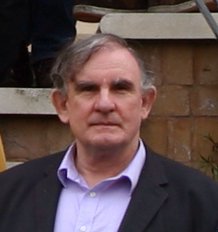John Papaloizou facts for kids
Quick facts for kids
John Papaloizou
|
|
|---|---|
 |
|
| Born | 1947 |
| Alma mater | Queen Mary, University of London University of Sussex |
| Scientific career | |
| Fields | Astronomy, Theoretical Physics and Applied Mathematics |
| Institutions | University of Cambridge |
John Christopher Baillie Papaloizou (born in 1947) is a famous British theoretical physicist. He is also a Fellow of the Royal Society, which is a very special honor for scientists. Professor Papaloizou teaches at the Department of Applied Mathematics and Theoretical Physics at the University of Cambridge.
His main work is about understanding accretion disks. These are like giant, spinning frisbees made of gas and dust that orbit around stars or black holes. He especially studies how these disks help planets form. He earned his D.Phil. degree in 1972 from the University of Sussex. His research back then was about how giant stars can become unstable.
Contents
Discoveries and Contributions
Professor Papaloizou has made many important discoveries in astronomy and physics.
The Papaloizou-Pringle Instability
In 1984, he worked with another scientist, Jim Pringle. Together, they discovered something called the Papaloizou-Pringle instability. This is a special kind of wobble or instability that can happen in those spinning disks of gas and dust around stars. Understanding this wobble helps scientists learn more about how planets are born.
Other Important Work
John Papaloizou also studied other types of instabilities. He looked at how stars can become unstable in different ways. His work helps us understand how stars and planets behave in space.
An Asteroid Named After Him!
A cool fact is that an asteroid is named after him! The asteroid 17063 Papaloizou was given his name to honor his important contributions to science.
Awards and Recognition
Professor Papaloizou was recognized for his amazing work in science.
Fellow of the Royal Society
In 2003, he became a Fellow of the Royal Society. This is one of the oldest and most respected scientific honors in the world. It means he is considered one of the top scientists in his field.
 | Shirley Ann Jackson |
 | Garett Morgan |
 | J. Ernest Wilkins Jr. |
 | Elijah McCoy |

